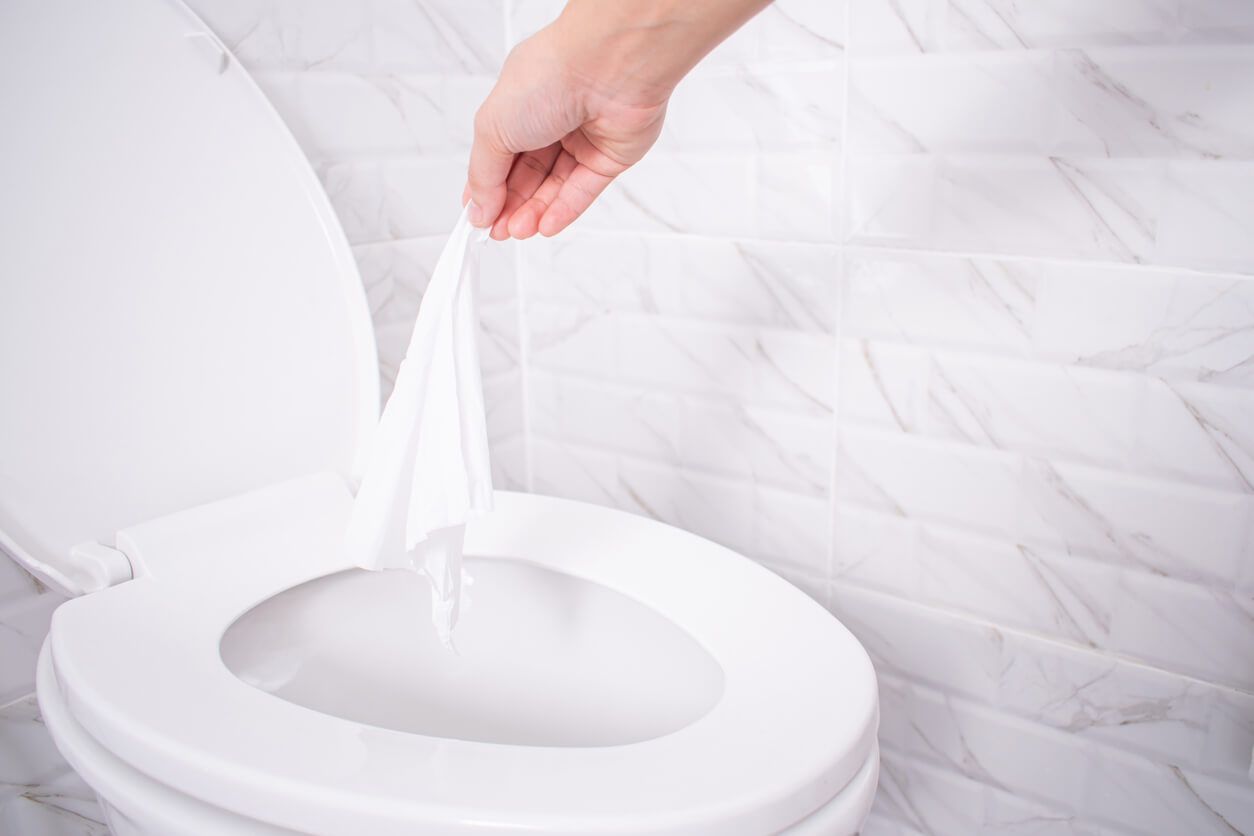When your bathroom’s wastebasket is full and you need to throw away a disinfectant wipe, your toilet might seem like an acceptable place to discard your trash. Think again! While it may seem like the wipe would make it “down the hole” with no issues, flushing items other than toilet paper and your “business” can have a bigger negative impact on your home’s plumbing, your city, and the environment than you might imagine.
WHEN WE FLUSHING SOMETHING, WHERE DOES IT GO?
Whatever you flush gets pushed by water pressure and gravity into your home’s drain-waste-vent system (unless the object you tried to flush clogs your toilet). Your home’s drain-waste-vent system contains pipes for used water and waste, as well as pipes that keep sewer gases from building up inside your home. The things you flush move through this system toward your home’s main drain.
Your home’s main drain meets up underground with your city’s sewer system, so whatever you flush is going to travel there. However, that’s not the end of the journey. Waste makes its way through the sewer system until it reaches a municipal wastewater treatment plant.
The wastewater treatment plant processes sewage in stages that separate water from a layer of sludge and remove pollutants, pathogens, and other contaminants. A lot of the sludge gets dumped into landfills, but some is converted into crop fertilizer and fuel that’s used to keep powering waste treatment facilities. Once the water goes through treatment, some of it is put back onto local waterways.
WHY WE NEED TO BE CAREFUL ABOUT WHAT WE FLUSH
Plumbers, sewer, and waste treatment plant workers, and environmental scientists all want you to follow this rule of thumb: do not flush anything but toilet paper and your “business.” There are multiple reasons why it’s critical to keep this in mind.
1. Toilet paper breaks apart easily in water, while other materials do not.
Toilet paper may not appear that different from a paper towel, napkin, facial tissue, or personal wipe, but the key difference is in its structure. Manufacturers design toilet paper to fall apart in water so that it won’t clog plumbing and sewer systems. These other materials are designed to retain their shape against moisture.
You can watch the behavior of toilet paper versus the behavior of “flushable” wipes soaked in water in this video from The Fit RV. Only one brand of wipes comes close to breaking down in the water as well as toilet paper.
2. You could end up with a nasty clog.
Your home’s drain and waste pipes don’t have a large diameter, which is why it’s so easy for a clog to form from flushing absorbent, durable materials like wipes and paper towels. If you have been flushing these items regularly and notice that you’re getting “slow drains” around the house, it’s time to get your drains cleared before a major clog causes a leak or sewage backup.
3. Even if something doesn’t clog your pipes, it impacts your city and could impact the environment.
Believe it or not, flushed wipes and paper towels cause significant problems for municipal sewer systems and treatment plants by clogging pipes and pumps. Some of these clogs grow to several feet across and weigh well over a ton, like the 10-foot, 1,200-pound clog dislodged from Surprise’s sewer.
The troubles faced by city sewers and treatment plants have gotten worse in 2020 due to the widespread toilet paper shortage, which has lead to many Americans substituting items for toilet paper. City officials in Phoenix and surrounding areas are urging citizens to throw paper towels, wipes, and the like directly into trash cans to avoid a major sewage backup or other issues. When a city’s sewer system has a significant blockage, sewage can back up into homes, the streets, or into the local environment, polluting both land and water.
Bottom Line: What goes down your toilet can affect you and ultimately many more people and creatures around you, so be sure to flush responsibly!
Whether it’s a toilet, drain, or sewer line giving you trouble, our reliable Gilbert plumbers at EZ Flow Plumbing, LLC have the expertise to help: (480) 351-1820.


